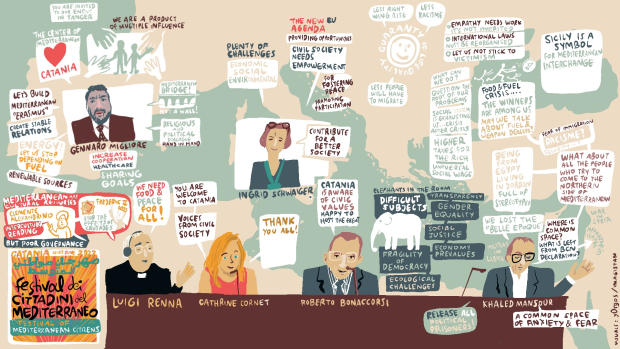Mediterranean Citizens Festival, Catania 2022: positive balance in terms of quality of meetings, encounters, and energy
News details

The great event which spread over 5 very intense days registered 70 events, 200 guests from over 30 countries. It was highly appreciated nationally and internationally and will hopefully leave its mark both in the lively city of Catania, at the center of the Mediterranean geographically and culturally, and in the active communities of Mediterranean civil society.
While the tragedy of war diverts our gaze towards Eastern Europe, the Mediterranean Citizens’ Festival has brought back to the public’s attention the importance of the Mediterranean. The event has not only highlighted the centrality of the Mediterranean as a geographic region, but also showcased the varied and multiple communities for whom the Mediterranean is a concrete commonality, a space in which they share the same aspirations and fight for the same rights. As many guests have highlighted and was then summarized in the closing debate by Immaculata dall’Oglio and Laila Kiki:
“If we did not let the war in Syria take this frightening turn, things would not have probably turned this way in Ukraine. We have left dictatorships on the southern shore go unpunished and this has set the stage for the latest tragic developments. We are all connected in some way”.
In the same vein, personalities such as David Abulafia or Esraa Abdelfattah, who pointed out, in the opening debate, how widespread phenomena such as racism, nationalism or authoritarianism, as well as single-identity policies, are deleterious, dangerous, and extremely counterproductive to stability and a peaceful coexistence. On the one hand, historian Abulafia pointed out how trade in the Mare Nostrum led to cross-fertilization that brought the shores of the Mediterranean far closer than land routes: and that therefore, “the Mediterranean is for all intents and purposes structured to welcome and not to repel.” On the other hand, Italian actor and playwright Moni Ovadia forcefully asserted that “nationalism is the most frightening pestilence in human history and acting following logics of borders drawn with a cigar is criminal, human beings belong to one and only species.”
“During these very intense days of debates, workshops and performances,” says Catherine Cornet, artistic director of the Festival, “We touched upon very difficult and painful topics such as the issue of EU migration policies (which still leads to discrimination, Illegal labor and loss of too many lives in the Mediterranean), the growing social inequalities, the weakening of the democratic model, and the increasingly violent attacks on freedom of expression, press, or faith.”
The themes discussed at the Festival could be summarized in the following key words: citizenship, hospitality, democracy, gender equality, social justice, resilience, environment and biodiversity, freedom of expression, and safeguarding human rights.
All concepts that, in the bustling turmoil of such a complex event, were declined through more than 70 events including some 40 intense debates; 5 thematic guided tours that opened each day of the Festival; 8 children’s activities; 4 participatory and self-managed workshops; 3 exhibitions of photos, maps and comics centred on landscapes and human histories; and finally a documentary programme hosted by the University of Catania’s City of Science, which screened high quality films that are rarely seen in theaters such as Michelangelo Severgnini’s uncomfortable L’Urlo or Kim Longinotto’s Shooting the Mafia, a true tribute to the great Sicilian photographer Letizia Battaglia.
The events took place in a dozen different locations in the city to facilitate the involvement of Catania’s civil society and institutions. The dialoguing guests, both international and local, interacted on stage and in informal moments, thus contributing to shaping a community-in-progress that was unusual and surprising. Many of them were “captured” by Greek cartoonist Yorgos Konstantinou who made extremely eloquent visual summaries.
The festival allowed us to rediscover the Mediterranean values we instinctively share, such as sociability through music and dance… The splendid evening in Piazza Dante with the Catanian company Zappalà Danza registered more than 600 attendees, while the concert by Maryam Saleh and Zeid Hamdan had over 400 people dance in the courtyard of the Palazzo della Cultura.
Finally, the icon of the event, the map of the Mediterranean by French cartographic artist Sabine Rhétoré, displayed in the middle of the courtyard of the Palazzo della Cultura was walked on, studied, and adopted by all: children, artists, journalists, and activists. The map does not show borders and highlights how the Mediterranean shores along the East-West axis are much closer than we think… Actually, just around the corner.
“Let this be the start of a citizen initiative for the construction of a free and united Mediterranean: let us take up the proposal for a voluntary constitutional process involving citizens and civil societies from the two shores aimed at building a ‘common house,” concluded Gianluca Solera, coordinator of Med Dialogue, which promoted the Festival, citing some of the proposals that emerged in recent days.
“Mediterranean citizenship is first and foremost a horizon that is formed through practices in the making. As many speakers have pointed out, we should create inclusive, multiple, and open citizenship free zones, real ‘free cities’ (just as there are free zones for trade/industry), where we can mend the fractures between the peoples of the Mediterranean and experiment with what should be the ‘common house’ to come”.
For more information, please contact :
Festival.MedCitizens@particip.com
Fatma Ladgham +216 98 139 745 fatma.ladgham@particip.com
or the Italian press office :
Domenico Simone +39 346 414 0204 domsimone@icloud.com
Anita Magno +39 329 81 64 320 magnoanita@gmail.com
Follow us on the festival’s official social networks
Facebook @FestivalMedCitizens
Instagram @festcittadinimediterraneo
Festival brochure
Log in with your EU Login account to post or comment on the platform.